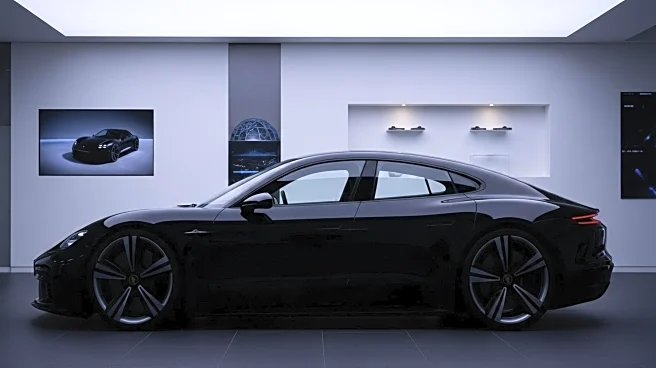What's Happening?
Porsche has announced a delay in the production of some future electric vehicle (EV) models, a decision that parent company Volkswagen (VW) predicts will result in a $6 billion loss in forward profits. This move comes during a global surge in EV sales, with Chinese manufacturers leading the charge by offering affordable EVs equipped with advanced battery and infotainment technology. Porsche's decision to slow its EV rollout contrasts with the rapid electrification of the automotive industry, particularly in Europe and China. The company plans to extend the availability of its current combustion engine models into the 2030s and introduce a new ultra-luxury SUV as a combustion or hybrid model, rather than an electric one.
Why It's Important?
Porsche's decision to delay its EV models could have significant implications for its competitiveness in the rapidly evolving automotive market. As EV demand continues to rise globally, particularly in Europe and Germany, Porsche's strategy may hinder its ability to capitalize on this trend. The company's reliance on combustion engines could also impact its environmental reputation, as transportation remains a major contributor to climate change. Additionally, the delay may affect VW's software partnership with Rivian, as Rivian's software is designed for EVs, not combustion vehicles. This strategic shift could result in increased costs and reduced market share for Porsche and VW, while benefiting faster-moving international competitors.
What's Next?
Porsche's decision to slow its EV rollout may prompt reactions from various stakeholders, including environmental groups and industry competitors. The EU's commitment to maintaining emissions targets could pressure Porsche to reconsider its strategy, as stricter regulations may limit the viability of combustion models. Furthermore, the company's reliance on VW's internal software project, Cariad, for combustion models may face challenges, given its previous difficulties. As the automotive industry continues to electrify, Porsche may need to adapt its approach to remain competitive and address environmental concerns.
Beyond the Headlines
Porsche's decision to delay its EV models highlights broader ethical and environmental considerations. The continued production of combustion vehicles contributes to pollution and climate change, posing health risks and economic costs globally. As fossil fuels receive substantial subsidies, the automotive industry's shift towards cleaner technologies is crucial for reducing emissions and mitigating climate impacts. Porsche's strategy may also influence other automakers' approaches to electrification, potentially affecting the industry's overall progress towards sustainability.











